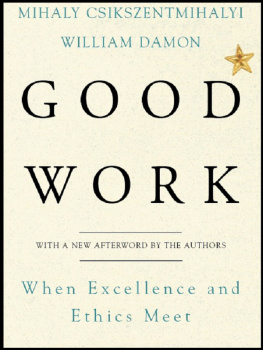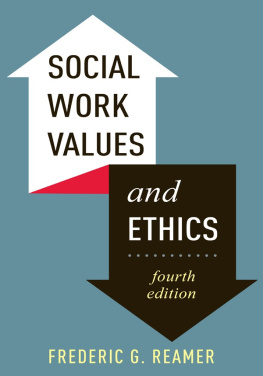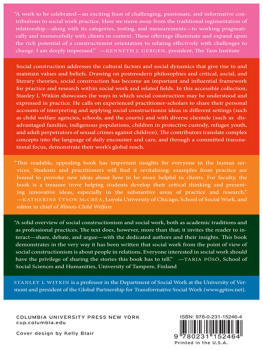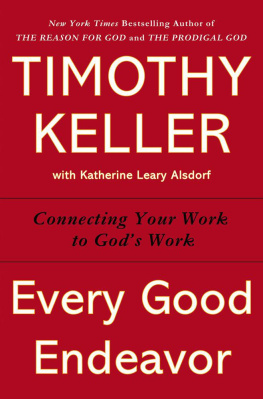GOOD WORK
Also by Howard Gardner
Intelligence Reframed
The Disciplined Mind
Extraordinary Minds
Leading Minds
Multiple Intelligences
Creating Minds
The Unschooled Mind
To Open Minds
The Minds New Science
Frames of Mind
Also by Mihaly Csikszentmihalyi
Becoming Adult
Being Adolescent
The Evolving Self
Creativity
Finding Flow
Flow
Also by William Damon
The Youth Charter
Greater Expectations
Some Do Care
The Moral Child
Self-Understanding in Childhood and Adolescence
Social and Personality Development
The Social World of the Child
GOOD WORK
When Excellence and Ethics Meet
HOWARD GARDNER
MIHALY CSIKSZENTMIHALYI
WILLIAM DAMON
FOR JOHN W. GARDNER
Good Worker
Copyright 2001 by Howard Gardner, Mihaly Csikszentmihalyi and William Damon
Published by Basic Books, A Member of the Perseus Books Group
All rights reserved. Printed in the United States of America. No part of this book may be reproduced in any manner whatsoever without written permission except in the case of brief quotations embodied in critical articles and reviews. For information, address Basic Books, 387 Park Avenue South, New York, NY 10016-8810.
Design by Jane Raese
Set in 11-point Adobe Garamond Roman
Library of Congress Cataloging-in-Publication Data
Gardner, Howard.
Good work : when excellence and ethics meet / Howard Gardner,
Mihaly Csikszentmihalyi, and William Damon.
p. cm.
Includes bibliographical references and index.
ISBN 0-465-02607-9 (hc); ISBN 978-0-465-02608-1 (pbk)
1. Job satisfaction. 2. Quality of work life. 3. Work ethic. 4. Professional ethics.
I. Csikzentmihalyi, Mihaly. II. Damon, William, 1944-. III. Title.
HF5549.5.J63 G355 2001
174'.4dc21 2001025950
PREFACE
How We Came to Write This Book
In 19941995, we three authors spent a year at the Center for Advanced Study in the Behavioral Sciences (CASBS) in Palo Alto, California, each working on a separate book. Although we had known each other and admired each others work for many years, we had never collaborated on a project. Our fields of interest overlap but are different. Gardner, a cognitive psychologist, is best known for his theory of multiple intelligences, which led him to study creators and leaders in different realms. Csikszentmihalyi, a social psychologist who writes from an evolutionary and motivational perspective, is best known for discovering the psychological state called flow, in which an individuals skills and challenges mesh in absorbing ways. His studies of flow have included groups ranging from surgeons to mountain climbers, and like Gardner, he has a special interest in creativity. Damon is a developmental psychologist who has long focused on social and moral issues. He has written definitive texts on moral development and, with Anne Colby, has carried out a pioneering study of individuals who have led exemplary moral lives. Despite our different foci in psychology, we had enough in common to enjoy exchanging ideas whenever we ran into each other on the cloistered CASBS grounds, overlooking nearby Stanford University.
One afternoon, our conversation turned to the question, If you had the choice, what sort of problem would you work on for the next ten years of your professional life? As we talked it became clear, first, that we did have the choice; and second, that our envisioned projects were in many respects very similar. Each of us had begun to struggle with the relationship between high-level performance and social responsibility, between excellence and ethics. We had been thinking about several key questions: Is it true that most creative scientists and artists are selfish and ambitious, unconcerned with the common good? Why is it that experts primarily teach techniques to young professionals, while ignoring the values that have sustained the quests of so many creative geniuses? Is the impact of science, technology, and communication predeterminedfor good or illor do we have some control over it?
This set of questions revolving around excellence and ethics proved so seductive that we returned to it again and again, gradually refining how we could study what we first (somewhat clumsily) called humane creativity. We envisioned interviewing and observing professionals at the cutting edge of perhaps a dozen fields that are essential to individual and social well-beingfields ranging from journalism and genetics to law and theater. The idea was to take stock of the kind of people who entered such professions and succeeded in them. We wanted to learn about their backgrounds, values, and goals. We planned to look at the ways they approached their work, as well as the opposition they encountered and the strategies they used to overcome it. We envisioned asking them to describe their dreams and nightmares about the future course of their chosen pursuit. Given our collective backgrounds in the study of creativity, leadership, and moral excellence, we were particularly interested in learning more about those persons who succeeded in melding expertise with moral distinction.
After leaving CASBS, we started assembling research teams at our respective universities and began applying for financial support to carry out our plans. At first, fundraising met with little success, perhaps because of our own inarticulateness in laying out the project, perhaps because the issues that engaged us were not yet seen as important by outsiders. Within a few years, however, our ideas seemed to gain momentum and garner gratifying interest among funders, whose support is gratefully noted in the Acknowledgments. The increasing interest in our work reflected a growing realization within our society: leading professionals currently face a particular challenge as they attempt to carry out their central missions, since conditions are changing rapidly, market forces are extremely powerful, and our sense of time and space is being radically altered by technological innovations like the Internet.
As our ideas coalesced and our planning proceeded, we moved away from the notion and terminology of humane creativity and toward that of good workwork of expert quality that benefits the broader society. What, we asked, promotes or impedes good work today? The first two fields we decided to investigate in depth were genetics and the media. At first we thought of these as two important but distinct fieldstwo professions in which the practitioners are grappling with how to do top-quality, socially responsible work at a time of extremely rapid change. But as our work progressed, we began to see instructive analogies and discrepancies between them. We came to conceive of the present book as a parallel study of two professions, one poised to control the composition of our bodies, the other with the potential to control the content of our minds. And we decided to focus on what it means to carry out good workwork that is both excellent in quality and socially responsible at a time of constant change. Thus was born what we now call the Project on Good Work.
From the beginning of the project, our concerns have spanned diverse professional realmslaw, medicine, theater, higher education, philanthropy, and more. In all of these we have recognized the same set of forces operating: the emergence of powerful and still dimly understood technologies; the overwhelming power of market forces and the concurrent decline of various competing ideologies and isms; the waning of an agreed-upon set of principles and of an ethical framework that has been designed to govern the decisions and behaviors of all members of a profession; the loss of powerful heroic role models that inspire the younger members of a profession and a concomitant foreboding sense that the future course of the domain is wrapped in uncertainty. Accordingly, throughout this book, we draw in examples from a variety of professional realms, because we are convinced that the challenge of good work confronts every professional today.








